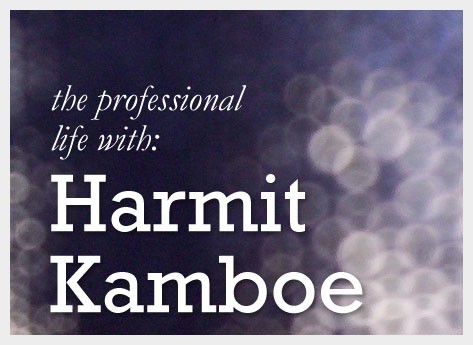
Harmit, as I read over your work experience, one thing that stood out is your focus on results. Why have you chosen to list out the results you’ve achieved rather than just list the work you’ve done for your employers – like so many others do?
Well, numbers are pretty much everything. They state the facts clearly and make it easy, at least in my mind, to figure out what works and what does not. At the end of the day, that is what every one wants to know.
In the case of some SEO work where I have had success, it comes down to having a basic understanding of how documents gets indexed and ranked.
I like the fact that the numbers take subjectivity out of the equation.
You search marketing work and case studies have shown some dramatic increases and over-achievement of key metrics. How were you able to achieve that and what should other people keep in mind if they want to achieve results like that?
I think everything comes down to understanding how things work. Knowing the problem is half the battle.
In the case of some SEO work where I have had success, it comes down to having a basic understanding of how documents gets indexed and ranked. Ask yourself why does some one else rank ahead of you? How can you provide more value to a user than them?
In the case of some of my PPC work, where I have had success, it comes down constantly eliminating the wasteful traffic and getting the CPA (Cost Per Action) to move lower. Proper recognition to overall click attribution is a big part of accurate measurement. It was a few years ago that did I some work with Circuit City. I was amazed at the number of phone orders that were being generated by some of the PPC work I was doing.
It sounds a bit contrived but it is true. Doing whats good for users is usually what is important and that is what search engines look for too.
In the case of some of my e-commerce work, it was all about opening up additional channels of relevant traffic and monitoring the Cost Per Order. As an example while working for an e-commerce retailer, researching and documenting the process and then selling on the different global Amazon sites under a different name and price point was something that allowed us to sell more on a commission only basis.
I think all one has to do is be able to question yourself and your tactics, every day and every week. Over time, a lot of little steps add up to make a substantial difference.
It seems like every day there are changes to search engine algorithms, how do you stay on top of all the developments in the space?
I think one of the things that has helped me with my work is to ignore the noise. If you work for a respected brand and do the basics well and keep doing them well, the results show up sooner than later.
It sounds a bit contrived but it is true. Doing whats good for users is usually what is important and that is what search engines look for too.
There are plenty of great blogs on key changes like webpronews.com, seomoz.org/blog, searchengineland.com that I subscribe to.
What does your typical day look like?
A. Follow up or investigate the ideas that you had on the commute to work. Keep building the case if there are things that you are hoping to push through.
B. Follow up on the status of your requests with other stakeholders in the organization (formally & informally).
C. Check your analytics software for key metrics.
D. Share your success with other stakeholders.
E. At the end of every month or quarter, check against the big picture road map to see what else needs to be tackled.
How do you approach productivity? What tools (apps, gadgets, etc) do you use to help you stay productive?
You can have all the tools in the world, but I believe at the end of the day, Excel, is what makes them usable.
I like to graph the increase in metrics along with plotting key initiatives so that I can look back and try and co-relate things as best as I can.
Do you have a good work-life balance? If no, why? If yes, how do you achieve it? What are you beliefs around this?
I think I do have a good work-life balance. In large part this is because of the employers I have been with. Perhaps, it comes naturally to folks who are in their 40’s (lol).
Can you share a personal or business challenge that was hard to deal with and how you overcame it and what you learned from it?
I remember when I first started getting into SEO, one of my clients being a manufacturer of Hot Sauce. They had limited content on their site and hence virtually no organic traffic.
You can have all the tools in the world, but I believe at the end of the day, Excel, is what makes them usable.
Over some conversations with the client, I found out that they had an internal database of recipes. The light bulb went on immediately. We ported over a few hundred recipes (which had Hot Sauce as a key ingredient) and organic traffic to the site exploded.
I think if you end up tinkering too much with the technical side of SEO and ignore what is of value to users, sooner or later you run out of steam.
What is your favourite quote of all time?
The definition of insanity is to keep doing the same thing over and over and expect different results.
What is one thing that your coworkers, clients or friends may not know about you?
I think I end up watching YTV Kids even more than Gol TV, thanks to my 7 year old. You know, some of the stuff on YTV kids is quite alright, lol.
If you weren’t doing what you’re doing now, what would you be doing?
I can’t really say what I would be doing, but I am quite sure it would not be half as much fun as my years in online marketing have been.
—
 Harmit Kamboe is an e-business specialist with a specialization in e-commerce and search marketing. Harmit has worked on both, the client and the agency side on the online marketing fence for over a decade. You can follow Harmit on Twitter here.
Harmit Kamboe is an e-business specialist with a specialization in e-commerce and search marketing. Harmit has worked on both, the client and the agency side on the online marketing fence for over a decade. You can follow Harmit on Twitter here.